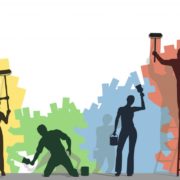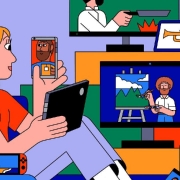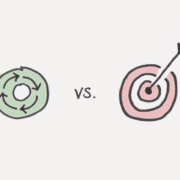Making Your Work More Meaningful
Image by wayhomestudio on Freepik
Curiosity is critical to professional success. A curious mind will spot and solve problems, while being unafraid to try something new. It will seek out the insights of others, and open itself to expanded thinking. A curious person will never succumb to apathy, instead pushing consistently for growth, innovation, and improvement. Anyone seeking to build a successful career must embrace curiosity.
But curiosity isn’t just essential to professional advancement — it’s central to crafting purpose and meaning at work. We all want to feel that our work is meaningful, and we all have an opportunity to make it so. But it takes curiosity — about ourselves, our work, and the people we work with — to unlock deeper purpose each day.
Craft Your Work
One of the best ways to enhance the meaning you get from work is through job crafting — the art of making small changes to your work life to turn the job you have into the job you want. The idea is that by making small changes to your work, you can tailor it to your unique passions, personality, and interests in a way that maximizes its meaning to you and others. My favorite example is Curtis Jenkins, a Dallas bus driver who managed to revolutionize his position to create what reporters called a “yellow bus utopia” while changing hundreds of lives.
Curiosity is a necessary pre-condition for job crafting. It starts with a self-evaluation. Ask yourself questions such as what am I good at (really)? What do I love to do? What makes me happy on the job? A thoughtful self-understanding explored deeply and with an open-mind can provide the foundation upon which job-crafting is built.
Then, apply this self-awareness to the job:
- What elements of my job could I tweak to be more meaningful for me and more impactful for others?
- Can what I currently do be done differently?
- Is my job, as structured, solving the most important problems — for the organization and those we serve — in the best ways?
To get started on this practice, make a list of the core people you serve in your work, then list the outcomes of your job that help to serve them well. Then reflect on your current tasks and see if there are ways in which you could serve those people as well or better by doing your work differently. You may find ways in which to craft your work that are both better for them and more meaningful for you.
Make Work a Craft
The second way to make work more meaningful is to make it a craft. For much of history, people would often practice professions inter-generationally. Trades like farming, carpentry, and cobblery might pass generation to generation in a family. And often a person would painstakingly perfect the craft over a lifetime. This quest for perfection and constant improvement created the most memorable achievements in history — from the murals of the Sistine Chapel to breakthroughs in genetics and the elegant simplicity of the original Mac.
This commitment to craftsmanship offers a sense of purpose in and of itself. As I explain in my book, we all gain meaning from work well done. There’s intrinsic motivation and purpose in knowing that we’ve put our best efforts into something, that we’ve honed a craft in a way that challenges us.
But how can we find opportunities for craft in our modern jobs? After all, building financial models or leading a team in a factory can feel a bit distant from Michelangelo’s historic masterworks or the genius of Steve Jobs. But craft is not about historical impact. It’s about self-improvement and a quest to push the limits of our own performance — to take on new challenges and achieve something hard and unique. When I was an analyst at McKinsey, this looked like building beautiful Excel models with elegant formulas that could last clients years. I did this whether the partners noticed or not because I took pride in challenging and improving myself. In your job, it’s something else. Curiosity can unlock it.
Ask yourself:
- What are the core elements of your job that require excellence?
- What skills do you need to perform that job well?
- What are one or two areas you can focus on now to make a craft, and how can you improve day-by-day until you do those things better than anyone else and to the best of your ability?
To begin, pick one area of your work you’d like to try to hone and perfect. Make this something you enjoy that is important to your job. Then assess the 5-10 ways you could make it better and begin working to improve them and challenge yourself. Keep notes each day or save old versions sequentially so you can see your improvement over time.
Connect Work to Service
There’s almost nothing in life that improves our sense of well-being and purpose like service to others. Numerous studies have shown that acts of service have an immediate impact on happiness and fulfillment. And in my own life, I’ve rarely felt as purposeful as when building a Habitat for Humanity home with colleagues, serving in a soup kitchen, or reading to kids at a local school.
Service doesn’t have to be confined to volunteer work in a community, however. As I’ve outlined in a previous article, there are at least six opportunities to serve others in any job: clients or customers, colleagues, capital, community, partners, and people we love. Knowing this and seeking opportunities for service in each of these areas can bring meaning to work.
But identifying the people we serve and ways to serve them requires deep-seeded curiosity. Consider these questions:
- Who are my clients?
- What do they need?
- What are the key obstacles to their well-being that I’m helping to overcome in my work, and how can I do it better?
- Which colleagues need my help the most?
- How can I effectively offer that with no expectation of return?
- Which two or three people could I best serve today?
These questions, founded in curiosity, are at the heart of service to others. Pick two of the six areas you like above — colleagues and customers for example. Think of 2-3 individuals in each of those two groups you could serve better and spend the next month trying to really understand them, and ways to use your work to serve them well.
Invest in Positive Relationships
In social science literature, perhaps nothing is as central to happiness as meaningful positive relationships with others. Such relationships are essential to Martin Seligman’s PERMA framework for flourishing and the findings of the Harvard Grant Study that “Happiness is love.” And those findings are echoed in the works of many others.
Relationships aren’t confined to our personal lives. Each workday we spend more than 8 hours with work colleagues, whether remotely or in person. And trying to navigate work in the absence of meaningful relationships is a recipe for disappointment. Positive relationships at work can help us to flourish, can make others happy, and can create extraordinary corporate cultures.
At work, as at home, relationships rest on empathy and curiosity. We can’t have a relationship of mutual care and respect with someone if we don’t display a genuine curiosity for that person. Ask:
- Who are they?
- What matters to them?
- What are their anxieties and fears, passions, and purpose?
- On any given day, how are they feeling?
- What are they interested in intellectually?
Constantly approaching others with curiosity will naturally build your own empathy and show those people you care — creating meaningful relationships in the process. When you are interacting with work colleagues over the next month or two, consciously make a game of trying to know them better. Ask more questions than you answer. And carve out time for conversations and interactions with your colleagues that don’t just accomplish your work tasks but (in a professional way) enhance the relationship you have with them. Improving your work relationships will make you and those around you happier, and it will probably make you more productive as well. Curiosity is undoubtedly essential to professional success, but it’s also at the heart of purpose. Living with greater curiosity at work can help us to craft jobs and professional environments that help us and others flourish.
CURIOUS ABOUT THE IMPACT OF OUR UNBIASED HR SOLUTIONS?
Take the first step towards transforming your remote work culture by requesting a free demo assessment from Great People Inside.
Our team of experts will guide you through the assessment process, showcasing the effectiveness and value of our tailored solutions for your organization.
During the demo, you will have the opportunity to explore the comprehensive features and functionalities of our psychometric assessments, experiencing firsthand how they can empower your HR strategies and drive positive outcomes. From personality assessments to cognitive abilities and team dynamics evaluations, our assessments provide valuable insights to enhance talent management and foster inclusive remote work environments.
Don’t miss out on this opportunity to test the power of unbiased HR solutions. Request your free demo assessment from Great People Inside today and embark on a journey of fair and effective talent management in the remote work era.
Together, we can unlock the true potential of your remote teams and achieve remarkable success. Request a Free Demo Assessment.

Sources:
https://www.forbes.com/sites/theyec/2022/07/26/10-tips-for-defining-and-achieving-meaningful-work-in-your-career/
https://stressandresilience.com/3-ways-to-make-your-work-more-meaningful/
https://achievecentre.com/blog/5-practical-ways-to-make-work-meaningful/











